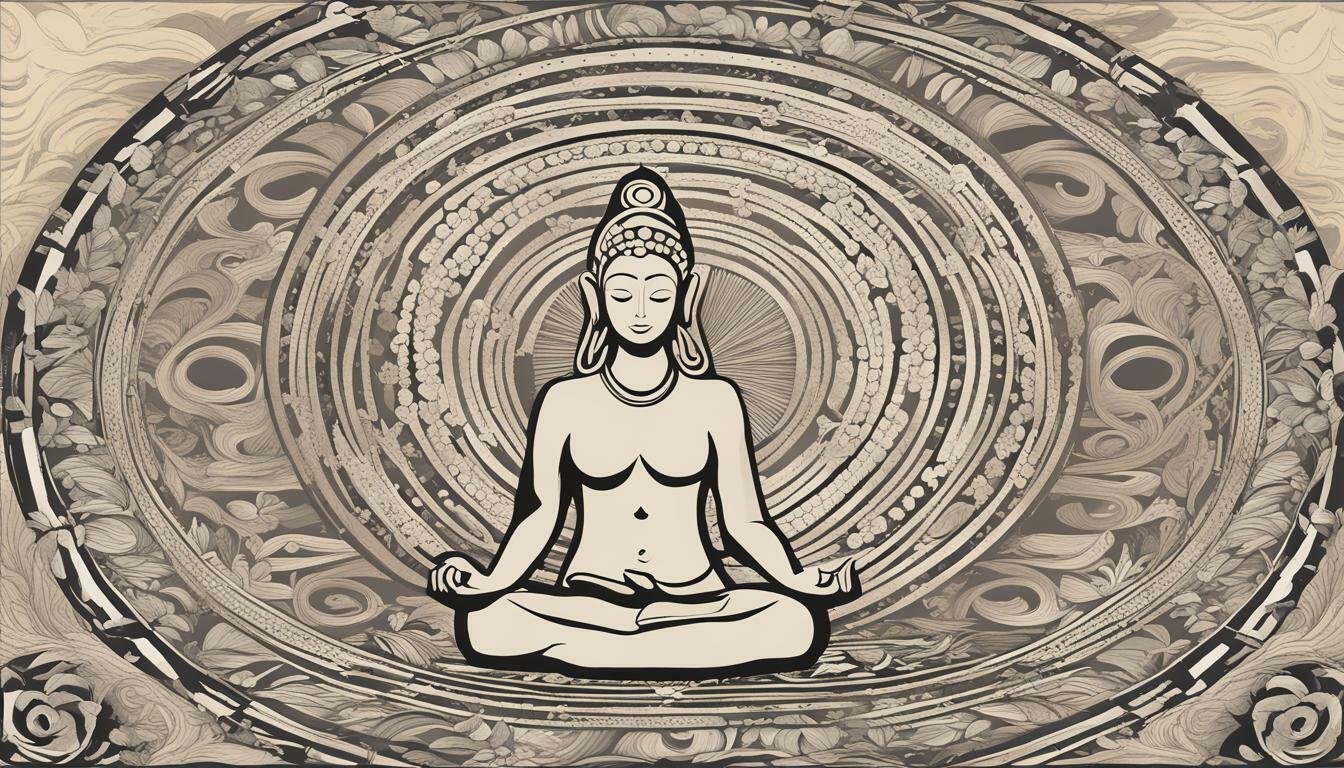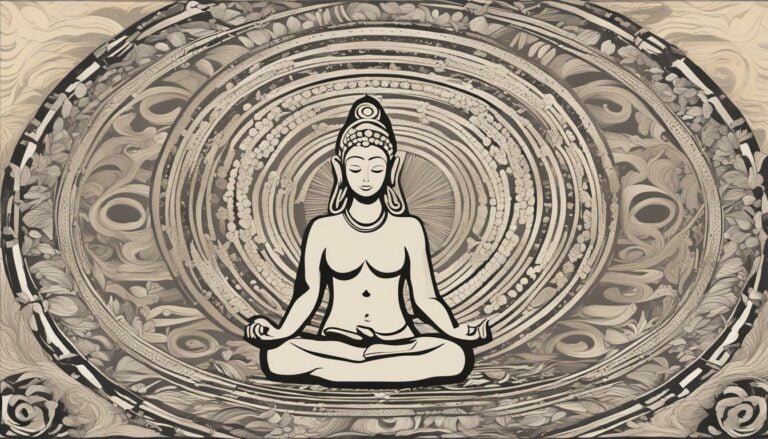
Meditation and hypnosis are two practices that may seem vastly different, but they have several similarities that are worth exploring. While they are often associated with different goals and have unique techniques, both meditation and hypnosis involve a state of focused attention, relaxation, and self-awareness. Let’s take a closer look at these practices and uncover their similarities.
Key Takeaways:
- Despite their apparent differences, meditation and hypnosis share several commonalities.
- Both practices involve a state of relaxation, focused attention, and self-awareness.
- Exploring these similarities can provide insight into how both practices can enhance overall well-being.
Understanding Meditation
Meditation is a practice that involves training the mind to focus and achieve a state of relaxation. It has been used for thousands of years in various cultures and religions, and has gained popularity in recent decades as a tool for reducing stress and improving overall well-being.
One of the key techniques used in meditation is mindfulness, which involves paying attention to the present moment without judgment. This can be achieved through focusing on the breath, sensations in the body, or a specific object or sound.
Research has shown that regular meditation can have a number of benefits, including reducing anxiety and depression, improving sleep quality, and increasing feelings of happiness and well-being. It has also been shown to have physical benefits, such as lowering blood pressure and reducing inflammation in the body.
Techniques Used in Meditation
There are many different styles of meditation, but they all involve some form of concentration and relaxation. Some popular techniques include:
- Guided meditation: In this technique, a teacher or audio recording guides the meditation, providing prompts for visualization or relaxation.
- Transcendental meditation: This involves the use of a mantra, a sound or phrase repeated silently to help the mind focus and achieve a state of deep relaxation.
- Metta meditation: Also known as loving-kindness meditation, this technique involves focusing on sending love and compassion to oneself and others.
Overlapping with Hypnosis
One of the key similarities between meditation and hypnosis is the state of relaxation that both practices aim to achieve. In both cases, the mind is brought into a state of deep relaxation, allowing for greater focus and concentration.
Additionally, the practice of mindfulness in meditation and the use of suggestion in hypnosis both involve accessing and influencing the subconscious mind. By doing so, both practices are believed to have the potential to bring about positive changes in behavior and thought patterns.
“Meditation can help us embrace our worries, our fear, our anger; and that is very healing. We let our own natural capacity of healing do the work.” – Thich Nhat Hanh
Exploring Hypnosis
Hypnosis is a state of highly focused attention and concentration, similar to meditation. It is often misunderstood and associated with stage performances where people are made to perform silly acts. However, hypnosis is a genuine therapeutic tool that can help people overcome fears, anxieties, and addictions.
During hypnosis, a person is guided into a state of relaxation and trance-like state by a therapist or self-hypnosis techniques. This trance-like state allows the person to access the subconscious mind, where long-standing beliefs, habits, and values are stored.
There are various techniques used in hypnosis, including visualization, suggestion, and imagery. In the visualization technique, the person is asked to imagine a relaxing scene that can help reduce stress and anxiety. In suggestion, the therapist presents positive affirmation to encourage positive behavior, such as quitting smoking. Imagery involves asking the person to imagine themselves overcoming a problem or achieving their goal, such as overcoming stage fright.
Research shows that hypnosis can effectively treat a wide range of conditions, including chronic pain, anxiety, depression, and post-traumatic stress disorder. It can also help improve sleep quality, boost self-esteem, and enhance overall well-being.
Hypnosis and meditation share many similarities, such as inducing a state of relaxation and altered consciousness. Both practices can also help reduce stress and anxiety and improve mental clarity and awareness. However, while meditation focuses on self-reflection and self-awareness, hypnosis is more about accessing the subconscious mind for therapeutic purposes.
Commonalities between Meditation and Hypnosis
Despite the apparent differences in their techniques and purposes, meditation and hypnosis share several commonalities. Here are some of the key similarities between these two practices:
| Shared Features | Meditation | Hypnosis |
|---|---|---|
| Relaxation | Meditation induces a state of deep relaxation, reducing stress and tension in the body and mind. | Hypnosis also induces a state of relaxation, often through relaxation techniques or guided imagery. |
| Concentration | Meditation involves focusing the mind on a specific object or concept, strengthening concentration and attention. | Hypnosis requires focused attention, often on a specific suggestion or phrase, cultivating concentration and mental focus. |
| Self-awareness | Meditation can promote greater self-awareness and insight into one’s thoughts, emotions, and behaviors. | Hypnosis can also increase self-awareness by accessing deeply embedded thoughts, emotions, and beliefs. |
| Subconscious | Meditation can facilitate access to the subconscious mind, promoting greater creativity and intuition. | Hypnosis involves tapping into the subconscious mind, often for the purpose of behavior modification or resolving emotional issues. |
Overall, both meditation and hypnosis involve altered states of consciousness, increased suggestibility, and the potential for therapeutic benefits. While they are distinct practices, exploring both techniques can offer a comprehensive approach to enhancing mental and emotional well-being.
Conclusion
In conclusion, there are several commonalities between meditation and hypnosis that make them both beneficial to one’s overall well-being. Both practices involve focused attention, relaxation, and heightened self-awareness. Additionally, they both have the ability to access the subconscious mind and create positive changes in one’s behavior and thought patterns.
By exploring both meditation and hypnosis, individuals can enhance their ability to manage stress, improve their mental clarity, and achieve a deeper sense of peace and relaxation. It is important to note, however, that hypnosis should only be practiced under the guidance of a trained professional.
Overall, the similarities between meditation and hypnosis highlight the importance of mindfulness and self-awareness in promoting physical and mental health. Incorporating these practices into one’s daily routine can lead to a greater sense of well-being and inner peace.
FAQ
Q: What is the difference between meditation and hypnosis?
A: While both meditation and hypnosis involve altered states of consciousness and relaxation, they differ in their purpose and techniques. Meditation is typically practiced for self-reflection, relaxation, and mental clarity, while hypnosis is often used for therapeutic purposes, such as behavior modification or overcoming certain challenges.
Q: Can meditation and hypnosis be used together?
A: Yes, meditation and hypnosis can be complementary practices. Some individuals may choose to use meditation as a way to enhance their focus and relaxation during hypnosis sessions, while others may combine meditation techniques with hypnosis techniques to achieve specific goals or address specific issues.
Q: Are there any risks associated with meditation and hypnosis?
A: When practiced correctly, both meditation and hypnosis are generally safe and beneficial. However, it is important to approach these practices with caution and seek guidance from trained professionals, especially when using hypnosis for therapeutic purposes. Some individuals may experience distressing emotions or memories during hypnosis, so it is crucial to work with a qualified practitioner.
Q: How long does it take to see the benefits of meditation and hypnosis?
A: The timeline for experiencing the benefits of meditation and hypnosis can vary from person to person. Some individuals may notice immediate effects, such as increased relaxation or improved focus, while others may need to practice consistently over a period of time to fully reap the rewards. Patience and consistency are key when engaging in these practices.
Q: Can anyone practice meditation and hypnosis?
A: Generally, anyone can practice meditation and hypnosis. However, it is important to consult with a healthcare professional or experienced practitioner if you have any pre-existing mental health conditions or concerns. They can provide personalized guidance and ensure that these practices are suitable for your specific needs.
- Self Harm Awareness Ribbon Color: Unveiling Its Meaning - August 21, 2023
- What Is Emotional Self Awareness: A Guide to Inner Growth - August 21, 2023
- Self Harm Awareness Bracelets: Show Support and Share Hope - August 21, 2023

